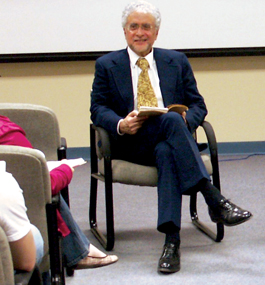Telling Time by a Painted Clock: Stephen Bluestone '61

Stephen Bluestone '61
by Susan Rardin
"In Bluestone’s poetry, the plays of Ben Jonson and the escapades of Harpo Marx go on forever,” says fellow poet Louis Simpson. “Whatever has happened must still be happening.”
For Stephen Bluestone ’61 — whose books “The Laughing Monkeys of Gravity” and “The Flagrant Dead” have been nominated for both the National Book Award and the Pulitzer Prize — tragedy and slapstick, heaven and hell are all connected. In “The Laughing Monkeys of Gravity,” Shakespeare’s Lear, the biblical Isaac, and comedian Oliver Hardy all must come to terms with the evil that befalls them. The achievements of Leonardo da Vinci are valued no more highly than the artistry of Charlie Chaplin and the Three Stooges.
Says Bluestone, “Chaplin, when he falls, always reaches for his hat, to put it back on. We’re all subject to the physical world, but having our dignity — those ‘hats’ on our heads — at the right angle is important.”
A winner in the Robert Penn Warren Poetry competition and of the Thomas Merton Prize for the Poetry of the Sacred, Bluestone has also had his work published in the 10-volume “Posen Library of Jewish Culture and Civilization.” Now, after three decades of teaching English literature and film at Mercer University in Georgia, he has returned to his native Brooklyn to focus on his most ambitious project yet, a long work about the Holocaust based on a recasting of the Book of Psalms.
“What I’ve discovered from rereading the Book of Psalms,” Bluestone says, “is that the Holocaust was an industrial/technological version of earlier disasters — of which the Babylonian exile and the destruction of Jerusalem were just two — that called into question the special relationship between mankind and a creator.” For instance, Psalm 60, Verse 1, reads, “O God, thou hast rejected us, broken our defenses …”
The project’s working title, “The Painted Clock,” recalls a train station at a World War II concentration camp where transported Jews disembarked within sight of a clock whose hands were not real, but simply painted.
“Time as we know it ceased to exist in the camps,” Bluestone observes. “An artificial reality was imposed that suspended the flow of creation itself and, perhaps, the connection between humanity and God.”
Some of Bluestone’s recent work has been set to music, which, he maintains, has a redemptive power that goes beyond words. His poem “West End Blues,” fictitiously articulating the thoughts of jazz great Louis Armstrong, has been scored by composer Curtis Bryant and will premiere this year at Manhattan’s Greenwich House Music School. “Holiness Everywhere,” Bluestone’s adaptation of a 12th-century Jehudah Halevi poem, also set to music by Bryant, was performed at the 2004 rededication of The Temple, Atlanta’s oldest Jewish congregation.
“What I try to do,” Bluestone summarizes, “is to frame poetry as a way of dealing with the relationship of the immediate and the personal to the timeless and the universal. Time flows within us. As human beings we’re individuals, but we’re part of the moral collective.”
